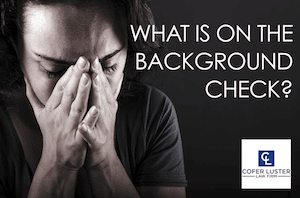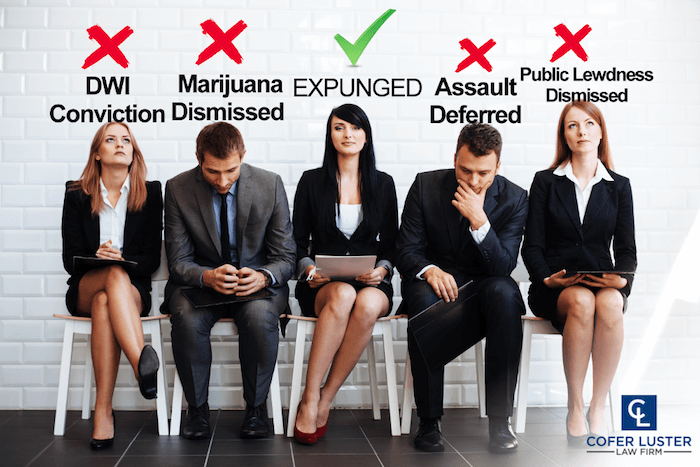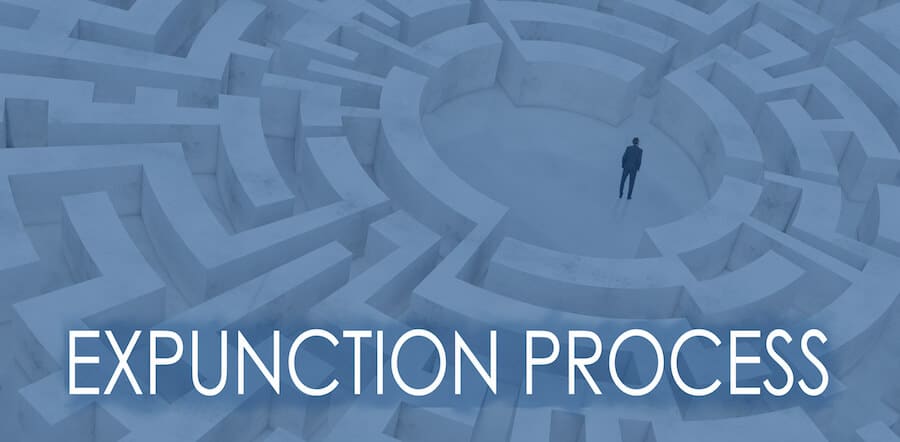
Expunge Criminal Record in Texas
Getting An Arrest Record Expunged
Do you have an old arrest or criminal record that is interfering with your ability to get a job, a loan, or a home? Do you even know what is on your criminal record? Would your life be improved if you could eliminate your criminal record with an expungement or order of nondisclosure?
In today’s digital age, having a clean criminal record is more important than ever.
Did you know that, even if you were only arrested but not convicted of a crime in Texas, the records of that arrest still appear in the Texas Department of Public Safety (DPS) Computerized Criminal History System? Also, you may not know the disturbing fact that the TX DPS is allowed to sell access to the state’s criminal database to private vendors. So, anyone with an Internet connection can get access to records of your arrest or deferred adjudication.
When you have been found innocent (not guilty) of a crime or if charges have been dismissed, you may want to Expunge your Criminal Record from all files relating to your arrest and trial. If you were convicted of a misdemeanor and completed a deferred adjudication probation, you may be able to request an order of nondisclosure.

This is list of criminal records that may be eligible for expunction:
- An arrest for a crime that was never formerly charged;
- A criminal charge that was ultimately dismissed or “No Billed” by a Grand Jury;
- Certain specific misdemeanor juvenile offenses;
- Conviction of a minor for certain alcohol offenses;
- Conviction for Failure to Attend School (Truancy);
- Arrest, charge or conviction on a person’s record due to identity theft by another individual that was actually arrested, charged or convicted of the crime;
- Conviction for a crime that was later acquitted by the trial court or the Criminal Court of Appeals;
- Conviction for a crime that was later pardoned by the Governor of Texas or the US President.
Our law office is downtown Fort Worth, Texas; however, we help people to expunge their criminal records throughout Texas. Usually, a short interview provides us enough information to know whether you can get your records expunged or if we should suggest a different course of action (Order of Non-Disclosure).

Top 10 Reasons to get your record expunged:
- Employment
- Education
- Housing
- Loans
- Licensing
- Insurance
- Firearm Rights
- Federal Assistance
- Adoption
- Volunteering

How to expunge your criminal record in Texas?
The process for expunction starts with understanding Chapter 55 of the Texas Code of Criminal Procedure and a few other statutes that may apply to the offense you are attempting to have expunged. Once you have determined you are eligible for an expunction, the next step is filing a Petition for Expunction with the district court requesting that the court grant an Order for Expunction. From a variety of sources, you can find basic expungement forms for a petition and order. As with any legal proceeding, errors in following procedure can have serious consequences. Therefore, it is always advisable to seek the assistance of an attorney.
The person applying for the expunction (i.e. Petitioner) must prepare and file the Petition or hire an attorney to help. There are very specific identifiers that must be included in the expunction petition, including: certain personal identifying information of the Petitioner; the offense charged; when the arrest occurred; when the alleged offense occurred; the name of the arresting agency; and a list of all of the agencies or facilities that may have a record of the arrest.
If the charged was actually filed in court, the expunction petition should also include: the cause number for the case; the name of the court; how the charge was resolved (i.e. dismissed, no billed by the grand jury or acquitted); and the date the charge was resolved. The expunction petition must be sworn to before a notarized when it is signed.
The petition should also have the specific statutory language authorizing the expunction. This language comes from, among other sources, Chapter 55 of the Texas Code of Criminal Procedure and other relevant case law to expunge your record in Texas.
Once the petition is properly drafted, then it must be filed in the proper court. Whether the expunction petition should be filed in municipal, county or district court will depend on the level of the offense of arrest. The appropriate court also varies by custom in the county you are in. In larger metropolitan counties, included Tarrant County, there may also be specific clerk’s offices that handle expunctions.
After the petition is properly filed and necessary parties are served, the court should conduct a hearing. Various agencies have the opportunity to contest an expunction. However, if all of the necessary legal requirements are met, then the court will grant the expunction.
Once the judge grants the expunction, the signed order must then be submitted to any and all agencies or organizations that may have records or files relating to the expunged offense. The records will then either be deleted or returned to the court clerk for destruction.
This process is arcane and can be daunting. That is why most people choose to hire an attorney to expunge your criminal record in Texas. Our law office is eager to help. Contact us today by submitting the form at the bottom of this page.
How to get a misdemeanor expunged in Texas
How long does a misdemeanor stay on your record? Forever, if you do not get it expunged. In Texas, the process of expunging a criminal record is often called “expunction.” In addition, some criminal records may be sealed by court order, called an “order of nondisclosure.” If your criminal record is expunged or sealed, it will no longer be visible to the general public, including potential employers. In most cases, you may say that you were never arrested or convicted of a crime.
If you were arrested for a misdemeanor or felony, your criminal record may qualify for expungement under the following conditions:
- you were acquitted of the crime for which you were charged
- you were convicted but subsequently found to be actually innocent
- you were convicted but subsequently pardoned
- you were formally charged by indictment or information and the case against you was later dismissed, and the statute of limitations has expired, or
- you were arrested but not formally charged and you satisfy the waiting period described below.
If you were arrested but were not convicted, you may be eligible for an expunction, which deletes and destroys all records of the arrest. If you successfully completed deferred adjudication probation, you may be eligible for non-disclosure, which seals the records from the general public.
This page answers the most frequently asked questions about expunction and nondisclosure of criminal records in Texas only. If you are interested in clearing arrest records from another state then the information below will not help you.
Felony Expungement Texas
How long does a felony stay on your record? Having a felony arrest or prosecution on your criminal record can greatly impact your future. Employers, landlords and other interested parties can easily run a background check and uncover your past trouble with the law. Luckily, in Texas you have the opportunity to clear a felony arrest off your record through expungement.
Convictions do not qualify for expunction in Texas. The only exception to that is if you are pardoned. Unfortunately, a conviction will always be on your record and there is nothing that can be done to fix that under the current laws unless you receive a pardon.

Fort Worth Expungement Lawyer
Our office has helped hundreds of people get their criminal records clear. We are located in Ft Worth, but we are happy to help people in surrounding counties (Parker County, Johnson County, Denton County). We will make time for a short interview with you, and we can tell you the different options for learning up your criminal record. Hopefully, you’re eligible for an expunction, but even if you’re not we may be able to direct you to other avenues of making background checks less painful.

